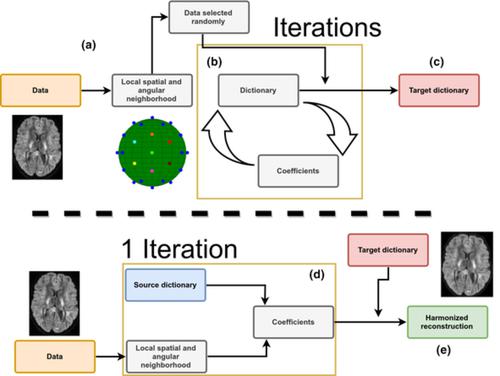当前位置:
X-MOL 学术
›
Hum. Brain Mapp.
›
论文详情
Our official English website, www.x-mol.net, welcomes your feedback! (Note: you will need to create a separate account there.)
Harmonization of diffusion MRI data sets with adaptive dictionary learning.
Human Brain Mapping ( IF 4.8 ) Pub Date : 2020-08-26 , DOI: 10.1002/hbm.25117 Samuel St-Jean 1 , Max A Viergever 1 , Alexander Leemans 1
Human Brain Mapping ( IF 4.8 ) Pub Date : 2020-08-26 , DOI: 10.1002/hbm.25117 Samuel St-Jean 1 , Max A Viergever 1 , Alexander Leemans 1
Affiliation

|
Diffusion magnetic resonance imaging can indirectly infer the microstructure of tissues and provide metrics subject to normal variability in a population. Potentially abnormal values may yield essential information to support analysis of controls and patients cohorts, but subtle confounds could be mistaken for purely biologically driven variations amongst subjects. In this work, we propose a new harmonization algorithm based on adaptive dictionary learning to mitigate the unwanted variability caused by different scanner hardware while preserving the natural biological variability of the data. Our harmonization algorithm does not require paired training data sets, nor spatial registration or matching spatial resolution. Overcomplete dictionaries are learned iteratively from all data sets at the same time with an adaptive regularization criterion, removing variability attributable to the scanners in the process. The obtained mapping is applied directly in the native space of each subject toward a scanner‐space. The method is evaluated with a public database which consists of two different protocols acquired on three different scanners. Results show that the effect size of the four studied diffusion metrics is preserved while removing variability attributable to the scanner. Experiments with alterations using a free water compartment, which is not simulated in the training data, shows that the modifications applied to the diffusion weighted images are preserved in the diffusion metrics after harmonization, while still reducing global variability at the same time. The algorithm could help multicenter studies pooling their data by removing scanner specific confounds, and increase statistical power in the process.
中文翻译:

弥散 MRI 数据集与自适应字典学习的协调。
扩散磁共振成像可以间接推断组织的微观结构,并提供受人群正常变异影响的指标。潜在的异常值可能会产生支持对照和患者队列分析的重要信息,但微妙的混淆可能会被误认为受试者之间纯粹由生物学驱动的变化。在这项工作中,我们提出了一种基于自适应字典学习的新协调算法,以减轻不同扫描仪硬件引起的不必要的变异性,同时保留数据的自然生物变异性。我们的协调算法不需要配对训练数据集,也不需要空间配准或匹配空间分辨率。超完备字典是通过自适应正则化标准同时从所有数据集中迭代学习的,从而消除了过程中扫描仪造成的可变性。获得的映射直接应用于每个主体的本机空间到扫描仪空间。该方法使用公共数据库进行评估,该数据库由在三个不同扫描仪上获取的两个不同协议组成。结果表明,所研究的四种扩散指标的效应大小得以保留,同时消除了扫描仪造成的变异性。使用自由水室(未在训练数据中模拟)进行的更改实验表明,应用于扩散加权图像的修改在协调后保留在扩散度量中,同时仍然减少了全局变异性。该算法可以通过消除扫描仪特定的混淆来帮助多中心研究汇集数据,并提高该过程中的统计功效。
更新日期:2020-10-14
中文翻译:

弥散 MRI 数据集与自适应字典学习的协调。
扩散磁共振成像可以间接推断组织的微观结构,并提供受人群正常变异影响的指标。潜在的异常值可能会产生支持对照和患者队列分析的重要信息,但微妙的混淆可能会被误认为受试者之间纯粹由生物学驱动的变化。在这项工作中,我们提出了一种基于自适应字典学习的新协调算法,以减轻不同扫描仪硬件引起的不必要的变异性,同时保留数据的自然生物变异性。我们的协调算法不需要配对训练数据集,也不需要空间配准或匹配空间分辨率。超完备字典是通过自适应正则化标准同时从所有数据集中迭代学习的,从而消除了过程中扫描仪造成的可变性。获得的映射直接应用于每个主体的本机空间到扫描仪空间。该方法使用公共数据库进行评估,该数据库由在三个不同扫描仪上获取的两个不同协议组成。结果表明,所研究的四种扩散指标的效应大小得以保留,同时消除了扫描仪造成的变异性。使用自由水室(未在训练数据中模拟)进行的更改实验表明,应用于扩散加权图像的修改在协调后保留在扩散度量中,同时仍然减少了全局变异性。该算法可以通过消除扫描仪特定的混淆来帮助多中心研究汇集数据,并提高该过程中的统计功效。


























 京公网安备 11010802027423号
京公网安备 11010802027423号